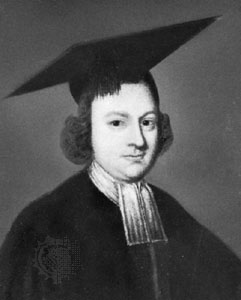Difference between revisions of "Chapter 12: 116-124"
Hotratsalex (Talk | contribs) (→Page 121) |
Hotratsalex (Talk | contribs) (→Page 120) |
||
| (One intermediate revision by the same user not shown) | |||
| Line 6: | Line 6: | ||
A nice astronomical pun on "serious business." Sirius is the brightest star in the night sky, aka "Dog Star." | A nice astronomical pun on "serious business." Sirius is the brightest star in the night sky, aka "Dog Star." | ||
| − | ==Page | + | ==Page 120== |
| − | ''' | + | '''"Nonetheless, 'tis the Friendly thing to do"'''<br /> |
| − | + | The capital 'F' indicates that Dixon means 'the Quaker thing'. 'Quaker' was originally a term of abuse; they called themselves 'The Society of Friends'. | |
==Page 121== | ==Page 121== | ||
Latest revision as of 12:06, 5 May 2013
Page 116
Christopher SmartChristopher Smart (11 April 1722 – 21 May 1771), also known as "Kit Smart", "Kitty Smart", and "Jack Smart", was an English poet. He was a major contributor to two popular magazines and a friend to influential cultural icons like Samuel Johnson and Henry Fielding. Smart, a high church Anglican, was widely known throughout London. From WIKI
Page 118
Sirius Business
A nice astronomical pun on "serious business." Sirius is the brightest star in the night sky, aka "Dog Star."
Page 120
"Nonetheless, 'tis the Friendly thing to do"
The capital 'F' indicates that Dixon means 'the Quaker thing'. 'Quaker' was originally a term of abuse; they called themselves 'The Society of Friends'.
Page 121
Shelton Clock
Clock made by John Shelton, clockmaker of London, see LINK.
Ellicott Clock
Clock made by John Ellicott, clockmaker of London, see LINK.
Page 123
What they feel is an Attraction, more or less resistable, to beat in synchrony with it
1st of many references to the difficulties of finding a ships longitude while at sea. The standard pendulum clocks prior to 1741 simply moved with the rocking of the boat and were therefore inaccurate for time keeping on the ocean. It wasn't until 1741 that John Harrison solved the problem with a special clock design.
